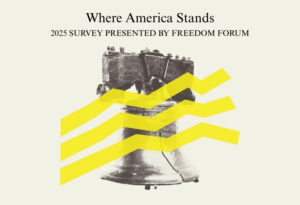 Freedom Forum, a nonpartisan nonprofit dedicated to fostering First Amendment freedoms for all Americans, recently released the 2025 edition of “The First Amendment: Where America Stands.” The annual survey measures what Americans know, believe and experience about the First Amendment — and how those views have shifted over time.
Freedom Forum, a nonpartisan nonprofit dedicated to fostering First Amendment freedoms for all Americans, recently released the 2025 edition of “The First Amendment: Where America Stands.” The annual survey measures what Americans know, believe and experience about the First Amendment — and how those views have shifted over time.
This year’s survey, conducted in partnership with McKee Wallwork from Aug. 1-8, polled Americans on their knowledge of First Amendment freedoms, their personal experiences with free expression and their views on issues ranging from campus protests and AI censorship to religious liberty, hate speech and the role of the press.
Freedom Forum’s 2025 “Where America Stands” survey reveals that while Americans overwhelmingly believe in the importance of the First Amendment, confusion and gaps in understanding persist, especially around the freedoms it guarantees and how they apply to everyday life.
95% of Americans have heard of the First Amendment, and nine in 10 agree it is vital. Yet only 10% can name all five freedoms it protects — religion, speech, press, assembly, and petition — without prompting. A quarter of respondents couldn’t name a single freedom.
Other key findings from the 2025 survey:
- Without help, 73% of Americans could identify freedom of speech, while only 13% could identify freedom of petition.
- 65% of Americans say they are afraid to speak freely for fear of violence, job loss or tension with family and friends. This is down from 71% in 2024.
- Young people (Gen Z) are the most likely to self-censor, with 82% saying they’re afraid to speak freely.
- Millennials are the generation most likely to see President Donald Trump as a First Amendment protector; baby boomers are most likely to see him as a threat.
- Only 26% could identify freedom of assembly unaided, despite a year of high-profile protests.
- 28% of respondents say they were unclear on how the First Amendment affects their daily lives, a 5-point increase from last year.
- 52% of Americans are concerned about being censored by artificial intelligence.
- 49% believe parents should be able to opt their elementary school children out of reading certain books based on religious beliefs.
- Support for the press as a government watchdog has grown to 61%, up from 56% in 2024.
